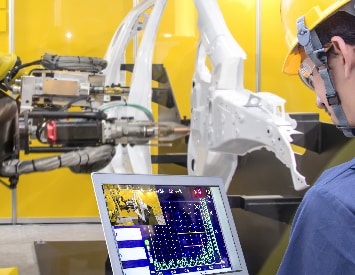With artificial intelligence threatening the future of tens of thousands of jobs in various fields, we look at the most future-secure engineering jobs in Australia, what they pay, and a few other details.
Engineering jobs are at the forefront of technological advancement and are vital in shaping the modern world. In every corner of the globe, engineering professionals are responsible for designing, developing, and maintaining infrastructure, machinery, and innovative solutions across diverse industries.
From civil engineering projects that transform skylines to electrical engineers revolutionizing energy systems and software engineers driving the digital revolution, engineering jobs offer many opportunities.
With a global demand for skilled professionals, engineers can work on exciting projects, collaborate with multicultural teams, and contribute to developing sustainable and cutting-edge solutions worldwide, especially in Australia.
But what makes Australia so appealing to engineers?
For anyone unfamiliar with this, Australia actually offers a thriving engineering industry with numerous opportunities for professionals in various fields. The growing demand for infrastructure development, technological advancements, and sustainable solutions ensures a promising future for engineers in this region. Additionally, the demand for new and environmentally friendly solutions has contributed to the growth of this sector.
We highlight four of Australia’s highest-paying and most secure professional engineering jobs, backed by industry research and job market trends.

4 Top In-Demand Engineering Jobs
Civil Engineer
The civil engineer plays a vital role in designing, constructing, and maintaining essential infrastructure such as roads, bridges, water treatment facilities, and skyscrapers. Civil engineering is one of the highest-paying professions in Australia due to population growth, urbanization, and infrastructure maintenance. Australia’s average civil engineer salary is $105,162 per year or $53.93 per hour. Entry-level positions start at $90,000 annually, while most experienced workers make up to $152,200 annually.
Requirements: To pursue a career as a civil engineer in Australia, you must meet specific criteria, including a bachelor’s degree in civil engineering or a related field, professional registration with Engineers Australia, a minimum of two years of supervised work experience, and completion of the National Engineering Register Stage 1 Competency Standards.
What To Study: To become a civil engineer, you’ll need to study various subjects related to civil engineering. Some key subjects include mathematics and physics, mechanics and materials, environmental engineering, geotechnical engineering, and structural engineering. Additionally, construction management, project management, and computer-aided design (CAD) software courses can enhance your skill set.
Mechanical Engineer
A mechanical engineer designs develops, and manufactures mechanical systems. They utilize mechanics, thermodynamics, and materials science principles to create machinery, engines, and other mechanical devices. This field offers abundant opportunities in aerospace, automotive, construction, energy, manufacturing, mining, and scientific services.
The average mechanical engineer’s salary in Australia is $115,000 annually or $58.97 per hour. Entry-level positions start at $91,699 annually, while most experienced workers make up to $126,750 annually.

Requirements: You’ll typically need a bachelor’s degree in mechanical engineering or a related field, professional engineer registration with Engineers Australia, a minimum of two years of supervised work experience, and a Professional Engineer’s exam completion.
What To Study: Consider pursuing a degree in mechanical engineering or a related field at a reputable university. After completing your degree, register as a professional engineer with Engineers Australia. This registration requires at least two years of supervised work experience, so finding a job after graduation is crucial.

Electrical Engineer
Electrical engineers are critical in designing, developing, and testing electrical systems and equipment. They are responsible for powering the modern world. This field offers excellent earning potential and is in high demand across various sectors such as construction, telecommunications, manufacturing, and aerospace.
Australia’s average electrical engineer salary is $115,048 per year or $59 per hour. Entry-level positions start at $95,445 annually, while most experienced workers make up to $160,000 annually.
Requirements: In Australia, this requires a bachelor’s degree in electrical engineering or a related field, relevant work experience, professional engineering certification (e.g., Engineers Australia), familiarity with relevant software and tools (e.g., CAD, MATLAB, Python), and knowledge of relevant standards and regulations (e.g., AS/NZS 3000, AS 2067).
What To Study: To prepare for a career as an electrical engineer, you should take courses such as electrical circuit analysis, digital systems and microprocessors, control systems, electromagnetics, power systems, electronic devices and circuits, communication systems, and computer programming. Some employers may also prefer candidates with a master’s or Ph.D. in electrical engineering or a related field.
Industrial Engineer
Industrial engineers design, develop, and improve complex systems, processes, and machines to optimize efficiency, productivity, and safety. They contribute their expertise to various industries, including manufacturing, healthcare, logistics, transportation, and services. Industrial engineering is among the most in-demand fields in Australia due to the increasing focus on productivity, efficiency, and innovation.
The average industrial engineer salary in Australia is $97,500 per year or $50 per hour. Entry-level positions start at $79,875 annually, while most experienced workers make up to $135,113 annually.

Requirements: To become an industrial engineer in Australia, you’ll need a bachelor’s degree in industrial engineering or a related field.
What To Study: You should enroll in a four-year bachelor’s degree program in Industrial Engineering or a related field. The curriculum typically covers Engineering Mathematics, Mechanics, Thermodynamics, Materials Science, Manufacturing Processes, Quality Control, and Project Management.
Engineering: A Resilient Field
Engineering has consistently held its position as one of the most significant professions worldwide, and its relevance will continue to endure.
Isaac Asimov, the visionary science fiction writer credited with popularizing the term ‘robotics,’ astutely remarked, “Science can entertain and captivate us all, but engineering truly shapes the world.”
This sentiment finds further support in the words of James Kip Finch, a highly esteemed American engineer, who affirmed that engineers have played a pivotal role in shaping history and continue to do so.
By acquiring the necessary qualifications and honing your skills, you can embark on a successful career in engineering and contribute to shaping a better tomorrow. Start your educational journey or enhance your skills by speaking to one of the skilled staff at the Engineering Institute of Technology now!
References
Top 10 Highest Paying In-demand Engineering Jobs in Australia
Engineer average salary in Australia, 2023
Discover trends in the Australian Jobs Market
Most Demanding Engineering Fields: Best 10 Jobs for Future 2025


